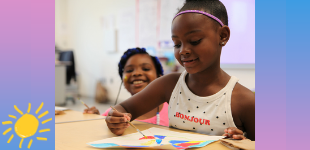In celebration of YA Week, a congressionally designated arts advocacy initiative, we are pleased to spotlight two new studies, which affirm that access and exposure to the arts not only boost students’ academic performance, but also strengthen their social and emotional development.
According to research carried out in Houston-area and Baltimore City schools, and involving programs of Young Audiences of Houston and Young Audiences of Maryland, respectively, the measurable benefits of arts-in-education extend far beyond the classroom.
Houston’s Arts Access Initiative, an innovative partnership program spearheaded by Young Audiences of Houston, has always recognized the importance of arts education as a vital component to every child’s development. Now, their convictions are backed up by compelling new data.
In “Investigating Causal Effects of Arts Education Experiences: Experimental Evidence from Houston’s Arts Access Initiative,” researchers Daniel H. Bowen (of Texas A&M University) and Brian Kisida (of the University of Missouri) conducted a randomized evaluation with over 10,000 students, from grades 3 through 8, enrolled in 42 schools across the Houston area – many of which lack a full-time arts teacher. Within this sample student population, classroom cohorts were randomly selected, via lottery, to receive substantial influxes of arts education, provided though school-community partnerships with local arts organizations, cultural institutions, and teaching artists. Services were facilitated by Houston’s Arts Access Initiative.
By comparing student outcomes in cohorts that received enhanced classroom exposure to the arts to the outcomes of those that did not, researchers found that arts-in-education experiences positively impacted student behavior in terms of reducing disciplinary infractions, increasing compassion for others, and bolstering writing achievement. They also found that arts-in-education experiences improved school engagement and college aspirations. According to Bowen and Kisida, policymakers should consider these multifaceted benefits when assessing the role and value of the arts in K-12 schools. The study was released through the Houston Education Research Consortium.
It was the first large-scale randomized control trial of an arts education program implemented in an authentic education setting. In the social sciences, randomized control trials represent the highest level of evidence for outlining causal relationships between treatment results and outcomes. Bowen and Kisida chose this method of analysis “to improve precision and strengthen [the study’s] ability to generate unbiased outcomes.”
Similar findings were reported in a separate analysis, “Summer Arts & Learning Academy: Results for 2018,” by leading arts education research firm WolfBrown. The study was designed to ascertain learning outcomes of students who participated in Baltimore City Public Schools’ 2018 Summer Arts & Learning Academy, operated by Young Audiences Arts for Learning’s Baltimore-based affiliate, Young Audiences of Maryland.
The 2018 Summer Arts & Learning Academy (SALA) was a free five-week arts integration program held at eight sites across Baltimore. Through hands-on activities taught collaboratively by professional artists and classroom teachers, over 2,000 students, from pre-K through grade 5, engaged in a variety of multidisciplinary art forms while learning math and literacy. After reviewing students’ test results at the beginning and end of the program, WolfBrown’s analyses revealed large increases in math, reading comprehension, and writing scores. According to research, students who participated in SALA realized positive academic growth as well as improved social-emotional skills.
Also encouraging was the growth seen among students with learning differences and other academic challenges. Research indicated that when compared to the rest of SALA participants, these students saw significantly more growth in both writing and social-emotional learning.
“Young Audiences’ evaluation contributes to the body of national research showing that when children have sustained opportunities to learn in and through the arts, they have greater rates of academic success,” says Stacie Sanders Evans, Young Audiences of Maryland’s President & CEO. Similarly, these studies help articulate the underlying and holistic benefits of arts-based in-school partnerships. By providing young people with opportunities to learn about and express themselves through the arts, we hope to strengthen their futures and their overall wellbeing.
Read the full reports here:
“Investigating Causal Effects of Arts Education Experiences: Experimental Evidence from Houston’s Arts Access Initiative”
“Summer Arts and Learning Academy: Results for 2018”
Read the full YA Week Resolution here: https://www.congress.gov/bill/116th-congress/house-resolution/312/text
To learn more about Young Audiences of Houston, visit their website at: https://www.yahouston.org/
To learn more about Young Audiences of Maryland, visit their website at: https://www.yamd.org/


